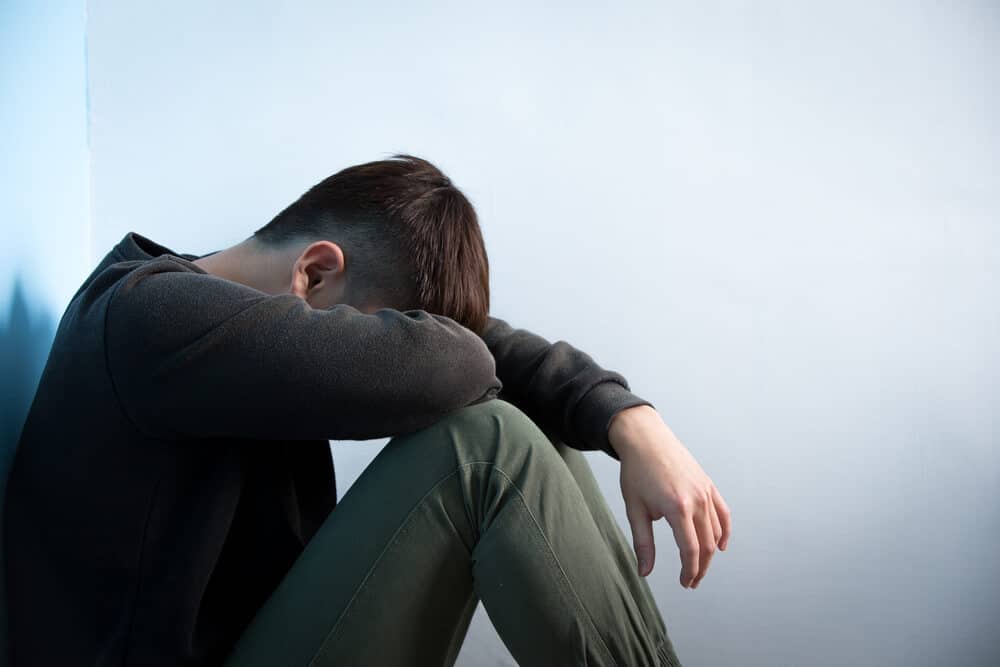We all face difficult times in life whereby we may feel very sad (i.e. after the passing of someone we love) or flat (i.e. after having a great idea rejected by our manager at work). However, different to these normal situations, after which these feelings fade away, depression is characterised by intense low mood and sadness that is present for a longer amount of time (i.e. from a fortnight to a number of years, in some instances).
Depression is a common mental health illness, and in many cases, affects not only the person suffering from depression, but additionally, the people surrounding them, such as their partner, children, family, friends and workmates. It can make achieving one’s day-to-day responsibilities very challenging, such as family needs, household tasks, study and/or work (where applicable).
A number of risk factors exist, which may increase the likelihood of a person developing depression. These risk factors include family history or upbringing, personality types or traits, serious and/or chronic physical illness, other mental health illness, persistent or ongoing stress, trauma, as well as a person’s current lifestyle or situation (e.g. unemployment).
In this article, we will outline the main types of depression. Specifically, we will address:
- Major Depression (otherwise referred to as ‘Depression’ or ‘Clinical Depression’)
- Dysthymic Disorder (or ‘Persistent Depressive Disorder’)
- Melancholia
- Psychotic Depression
- Perinatal (Antenatal and Postnatal) Depression
- Seasonal Affective Disorder (Seasonal Depression)
- Bipolar Disorder, and
- Cyclothymic Disorder.
Let’s get started.
Major Depression
Major depression, which may also be referred to as ‘depression’ or ‘clinical depression’ is characterised by chronic and intense sadness and low mood. Feeling a little down or miserable occasionally is considered normal. Where depression is evident however, a person’s sadness and low mood (and other relevant symptoms) may interfere with their ability to go about their daily life as they would normally. Depression can negatively impact interpersonal relationships as well as a person’s work life.
Signs and Symptoms of Major Depression
In addition to feeling intensely sad, an individual suffering from major depression may also feel hopeless and helpless. They may often feel teary, agitated and irritable, and find some situations especially frustrating and challenging (that would normally not present a problem). As a result, angry outbursts may occur. Feelings of anxiety or restlessness may also be evident.
A lack of interest in some or even all activities in some cases, especially those that previously brought great pleasure (e.g. hobbies), is a key sign and symptom of major depression. Additionally, a lack of energy and tiredness may be apparent, which can make achieving day-to-day tasks overwhelming and exhausting. Major depression can also cause fluctuations in appetite and weight, whereby a person under- or over-eats, leading to weight loss or weight gain.
Sleep is often disturbed whereby a person is suffering from major depression. In many cases, a depressed individual will experience insomnia (such as difficulty falling asleep, staying asleep, waking much earlier than normal, or a combination of the above), and in some cases hypersomnia is an issue (i.e. over-sleeping).
Major depression may interfere with a person’s ability to think clearly, recall information, concentrate effectively and make decisions. An individual affected by major depression may experience feelings of guilt, emptiness and worthlessness and social withdrawal from family, friends and/or colleagues may occur.
Physical health problems, such as headaches, muscle pain and constipation may be evident, as well as regular thoughts of self-harm, suicide or death where a person is battling with major depression.
Dysthymic Disorder
Dysthymic Disorder, also referred to as ‘Persistent Depressive Disorder’, is a chronic, mild form of depression that is considered less severe than major depression and presents with a smaller number of symptoms. In general, for a medical professional to make a diagnosis of dysthymic disorder, symptoms must have been present for a significant period of time i.e. a minimum of two years or more.
Signs and Symptoms of Dysthymic Disorder
A person suffering from dysthymic disorder very regularly feels depressed (i.e. largely flat or sad), and may lose interest in activities that brought lots of joy in the past. Energy levels and therefore a person’s normal level of productivity may be affected. Dysthymic disorder may lead to an individual feeling excessively agitated or angry, as well as problems concentrating and coming to decisions.
Loved ones and colleagues may identify a person battling with dysthymic disorder as gloomy and unable to have fun and experience joy, even during exciting events and periods of life. A person suffering from dysthymic disorder may withdraw from family and friends. Dysthymic disorder can cause a person to feel hopeless, incapable or inadequate compared to others and it may negatively affect self-esteem. Excessive guilt or worthlessness may be apparent.
Changes to appetite may occur, which may lead to weight loss for some individuals, and weight gain for others. An inability to sleep properly (i.e. insomnia) or oversleeping (hypersomnia) may be an issue for someone battling with dysthymic disorder, and ruminating thoughts of self-harm, suicide or death may be prevalent.
Despite experiencing a smaller number of less severe symptoms, dysthymic disorder may have an adverse effect on a person’s relationships with others, and can make it difficult to achieve day-to-day responsibilities, such as those at home and in the workplace.
Melancholia
Melancholia is a severe form of depression, characterised by slow thoughts, speech and physical movement. In addition to the symptoms of major depression, a person suffering from melancholia may also experience a number of the following signs and symptoms:
Signs and Symptoms of Melancholia
A significant loss of pleasure in the vast majority of, or in some cases, all activities may be evident for an individual experiencing melancholia. Melancholia can cause a person to feel significant despair, excessive guilt and worthlessness. When a positive event occurs, melancholia may strip a person’s ability to experience feelings of joy and pleasure.
Recalling information can be made especially challenging where a person is suffering from melancholia. The inability to sleep properly may be a significant problem, and considerable weight loss may occur. Movement is often slowed, and in some cases, movement may become agitated and irregular.
Where a person is battling melancholia, their symptoms are often most significant and challenging in the morning.
Psychotic Depression
Psychotic depression is characterised by severe depression that involves psychosis (i.e. seeing, hearing or believing things that do not exist). Common hallucinations that occur when a person is suffering from psychotic depression include hearing voices or seeing people or objects that aren’t real. Delusions (i.e. illogical thoughts and beliefs) may also be experienced by someone with psychotic depression. For example, intense feelings of failure or guilt for something they did not in fact do (e.g. crime). Despite not forming part of reality, hallucinations and delusions experienced by someone with psychotic depression appear real to them. These hallucinations and delusions can cause excessive fear and panic.
Signs and Symptoms of Psychotic Depression
A person battling with psychotic depression may often feel agitated and angry. They may express things that do not make sense to other people, or in some instances, they may not say much at all and feel embarrassed or ashamed about their situation. As a result, loved ones may find it difficult to communicate with them.
Psychotic depression can cause feelings of fear, anxiety and hypochondria, due to certain hallucinations or delusions. Insomnia may be an issue, and a sufferer may spend much of the night awake (and hence require rest throughout the day). Psychotic depression can cause a person to withdraw from social activity, and in some cases, to neglect personal hygiene and appearance.
‘Psychomotor agitation’, or the inability to relax, is a common symptom of psychotic depression, whereby a person is unable to comfortably sit still, nor stop fidgeting. In other instances, ‘psychomotor retardation’ may occur, characterised by slow movements and thoughts.
Perinatal (Antenatal and Postnatal) Depression
Perinatal depression refers to depression experienced during pregnancy (antenatal depression) and in the twelve months following the birth of a child (postnatal depression). The same symptoms are experienced in both antenatal and postnatal depression and hence treatment for each of these mental health illnesses is the same.
Emotional ups and downs throughout pregnancy and in the few weeks after a child is born (often referred to as the ‘baby blues’) are considered normal and disappear relatively quickly. However, in the case of antenatal and postnatal depression, these difficult emotions (i.e. feeling intensely sad and flat) linger and can drastically affect an expecting or new mother’s (or father’s) relationships and day-to-day life. It is important to note that perinatal depression can affect both women and men.
Signs and Symptoms of Perinatal (Antenatal and Postnatal) Depression
Feeling chronically sad, flat, teary and emotional (without an obvious cause) is a key symptom of perinatal depression. Perinatal depression can also cause an expecting or new parent to feel irritable and in some cases, resentful, to their baby, partner, and other people around them. In some cases, perinatal depression can cause a person to feel numb and disconnected. Regular mood swings may also occur.
Perinatal depression can make getting moving feel very overwhelming and challenging, and can leave a mother or father affected by the illness to lack energy as well as interest in a wide range of different activities (including those that previously brought great joy).
Difficulty thinking straight, concentrating, remembering and making decisions may also be apparent. Perinatal depression may cause a mother or father to feel worthless, hopeless and helpless, and can cause a reduction in self-confidence and self-esteem. Insomnia or excessive sleeping (hypersomnia) may occur, alongside losing or gaining weight due to appetite changes.
Women and men suffering from perinatal depression may be fearful of leaving the house, as well as afraid of taking care of their baby on their own without the support of other people. Social withdrawal from family and friends is common. In some cases, a person with perinatal depression may be affected by thoughts of self-harm, harming their baby, suicide and/or death, and may participate in risky activities, such as drinking alcohol. Failure to take good care of oneself may also be evident.
Seasonal Affective Disorder (Seasonal Depression)
Seasonal Affective Disorder (SAD) is commonly known as seasonal depression and is a type of depression that is linked to changes in seasons. At roughly the same times each year, symptoms of SAD become apparent and disappear. The same symptoms must be experienced throughout winter (or summer, in a smaller number of cases) for two years or more, in order for a medical professional to make a diagnosis of seasonal affective disorder.
It is not yet fully understood as to the exact causes of seasonal depression, and a number of different factors may be involved in its development. These factors include a reduction in sunlight hours each day (hence a disturbed circadian rhythm) and disrupted melatonin and serotonin levels, which may affect a person’s sleep and mood, accordingly.
Signs and Symptoms of Seasonal Affective Disorder
Seasonal depression leads to a person feeling intensely sad and flat and can leave a person feeling drained and very tired. Waking up and getting out of bed in the morning can be particularly difficult for a person battling with seasonal affective disorder. Oversleeping is common, especially during periods of cooler weather.
Feeling flat and sluggish (i.e. unable to get going) throughout winter can lead to an increased appetite and weight. It is not uncommon for a person with seasonal depression to regularly crave carbohydrates. (In some instances, for a person who struggles with seasonal affective disorder through summer, insomnia may be an issue, alongside a reduction in appetite and weight).
A loss of interest in activities, especially those that brought great joy in the past (like hobbies, for example), may be apparent for a person suffering from seasonal depression. SAD may cause social withdrawal, a lack of physical activity and avoiding leaving the comfort of home.
Seasonal depression can cause an individual to feel irritable, anxious and agitated, as well as hopeless and worthless. It may also interfere with a person’s ability to focus and achieve what they need to of a day. Some people battling SAD may also experience thoughts regarding suicide or death.
Bipolar Disorder
Every individual is subject to ups and downs throughout life, however, when an individual’s mood swings from high to low (i.e. depression) and low to high (i.e. mania) and these acute mood swings disrupt the ability to go about a normal life, a person may be suffering from bipolar disorder, a serious mental health illness. The two different periods (otherwise referred to as ‘episodes’), depression and mania, can last from a few days up to many months at a time.
Bipolar disorder can take on one of three unique forms (whereby the most common forms are Bipolar I and II). (Cyclothymic disorder may be considered as a more mellow form of bipolar disorder and shall be introduced in the next section of this article).
1. Bipolar I
Where a person suffers manic episodes (characterised by extreme mood and behaviour), a diagnosis of Bipolar I is made. (In the majority of cases, a minimum of one depressive episode will also have occurred). Mixed episodes (i.e. a mix of simultaneous mania alongside depression) may also be experienced by people suffering from Bipolar I.
2. Bipolar II
Bipolar II is characterised by a mix of both severe depression and hypomania (i.e. less severe symptoms of mania, whereby symptoms have less of an impact on the ability to function regularly in comparison to full-blown mania). Dissimilar to Bipolar I, extreme manic episodes do not occur.
3. Bipolar Disorder
In the case of a person who is experiencing some bipolar symptoms that are not characteristic of either Bipolar I or Bipolar II, it may be concluded that they are suffering from ‘Bipolar Disorder’.
It can be very challenging to identify the warning signs of bipolar disorder, and these warning signs may include a mix of family history, high stress, sleep deprivation, thyroid problems, some medications, substance abuse and seasonal changes.
Signs and Symptoms of Bipolar Disorder
Manic State
There is a wide array of signs and symptoms that may be present during a manic episode or period experienced by a person suffering from bipolar disorder. These signs and symptoms include increased energy and/or hyperactivity. Over-excitement may be apparent, as well as a feeling of elation or euphoria (sometimes referred to as feeling ‘high’). A manic episode may see a sufferer feeling overconfident, optimistic, as well as invincible. Rapid thoughts and speech may occur, and a person may have grandiose and unrealistic ideas or plans.
A person undergoing a manic episode may be easily distracted and have trouble focusing on one individual task at a given time. They may have trouble sleeping and may also experience a reduced requirement for sleep. A manic episode is also characterised by a lack of insight and/or impaired judgement. A person may engage in reckless, risky or impulsive behaviour (such as significant and sudden spending) and may feel angry, irritable and possibly aggressive. Delirium or hallucinations (such as hearing voices) may also occur.
Depressed State
A wide variety of signs and symptoms may exist during a depressive episode or period experienced by a person battling bipolar disorder. A person suffering through a depressive episode may experience intense and overwhelming feelings of sadness or low mood. They may feel hopeless, helpless and worthless and may also observe feelings of irritability, guilt or anger. A lack of interest in activities that brought significant joy in the past may occur, alongside a lack of motivation to do and participate in things.
A depressive episode may see a person’s speech and/or movement slowed and may affect their ability to recall information and concentrate well. They may experience difficulty completing basic tasks and may have trouble making decisions. Restlessness and sleeping difficulties (such as insomnia) are not uncommon. In some cases, oversleeping or hypersomnia may occur.
A person suffering a depressive episode may lack mental and physical energy and feel exhausted much of the time. They may also feel isolated and undergo social withdrawal from the people close to them, as well as social events. Appetite changes may be apparent (increase or decrease) and taking basic care of oneself (e.g. showering regularly) can become challenging. A depressive episode may also see a person having delusions and/or thoughts of suicide or death (it is vital to take this very seriously).
Regardless of whether a person is experiencing signs and symptoms of a manic or a depressed state, it is vital that professional assistance is sought for bipolar disorder, as it often worsens where treatment is not sought.
Cyclothymic Disorder
Cyclothymic disorder may be considered as a more mellow form of bipolar disorder, whereby an individual suffers from a combination of mild depression as well as hypomania (i.e. elevated mood), however, they do not experience severe episodes of either type (i.e. manic or depressive). Manic and depressive symptoms experienced by a person with cyclothymic disorder are less severe and do not occur for long periods of time, unlike those experienced by people suffering from bipolar disorder (and major depression). However, symptoms of cyclothymic disorder do largely impact a person’s ability to manage interpersonal relationships, work, and daily activities and responsibilities.
Symptom patterns in individuals battling cyclothymic disorder are often irregular and unable to be predicted (i.e. moods oscillate between mild depression and hypomania). Cyclothymic disorder is diagnosed whereby an individual has been experiencing persistent, fluctuating moods for a period of two years of more. Mild depression or hypomania may be experienced anywhere from a few days up to eight weeks, and these moods may be separated by periods of normal mood, in some instances.
Signs and Symptoms of Cyclothymic Disorder
Hypomania
Symptoms of hypomania are comparable to manic symptoms, however, are less severe and last for shorter periods of time.
Hypomania may be identified where a person feels an increased amount of energy and regularly feels restless. They may experience a feeling of euphoria, alongside rapid and dynamic thoughts and speech. They may have grandiose beliefs about their ability and exercise poor judgement.
Hypomania may see an individual struggle to concentrate and be easily distracted. They may often feel irritable and have a reduced need for sleep. They may exhibit impulsive behaviour (e.g. shopping sprees) or aggressive behaviour and also deny that there is anything unusual about what they are experiencing. Substance abuse may also be evident, such as alcohol or drugs.
Mild Depression
Symptoms of mild depression are comparable to depressive symptoms, however, are less severe and last for shorter periods of time.
A person suffering through a period of mild depression may feel persistently flat or sad, as well as hopeless and worthless. They may lack energy and lose interest in activities that normally bring great joy and may withdraw from friends and family. Trouble concentrating, recalling information or making decisions may be evident, as well as difficulty sleeping (or in some cases, hypersomnia).
An individual’s appetite may increase or decrease, and their weight may also fluctuate accordingly. A person suffering from mild depression may have regular thoughts of suicide or death.
As you can see, a number of different types of depression exist, as outlined in detail throughout this article. When left untreated, depression, no matter what type, can wreak havoc with your physical, mental and emotional health and can negatively impact your relationships with others, as well as your employment. If you or someone you know are struggling with depression, do not hesitate to get in touch with our friendly team at Blissiree Pty Ltd, to help you get back to feeling the happiest version of yourself as soon as possible.









